Ready to learn more?
Get all the details straight to your inbox!
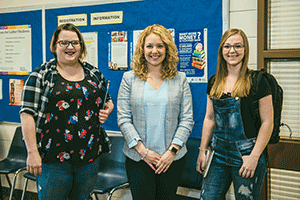
The priority deadline for academic application is March 15. To book a personalized enrolment counselling appointment, contact our Recruitment Office at 1-306-206-2117.
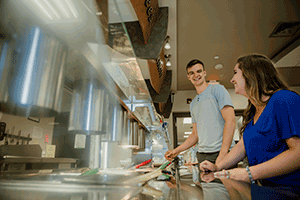
Eating better means studying better. The Luther Cafeteria offers fresh, healthy, nutritious meals seven days a week with a self-serve “all-you-care-to-eat” concept students prefer.

To enrol as a Luther College student, simply fill out the University of Regina application form and select Luther as your campus of choice.
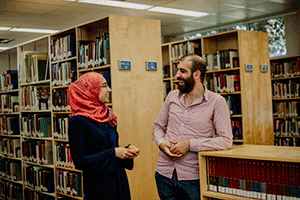
The Luther Library has over 24,000 items in its collection, 5,000 books checked out per year, and 7,000 students who come through its door per month.
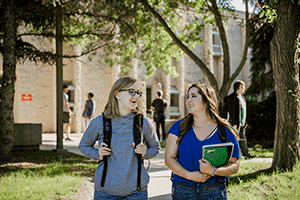
Luther College is a great choice for high school to university transition. Enjoy all the benefits of a larger campus, without feeling lost in the crowd. Our community is full of caring mentors and peers to ensure a positive student experience.
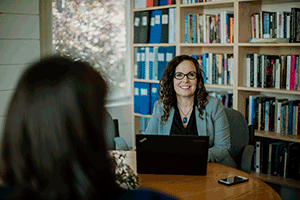
Free enrolment counselling support and invaluable one-on-one academic advising are available for all programs at Luther College.
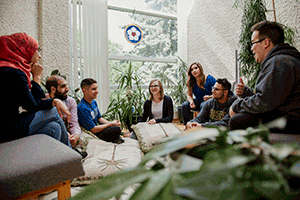
Luther College appeals to students who want to study in a safe, nurturing, and inclusive environment. We welcome students of all faiths, ethnicities, backgrounds, religions, genders, and sexual orientations.
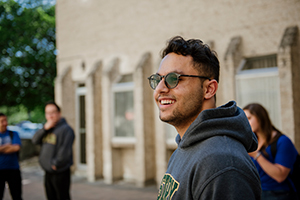
Every degree program at Luther College offers a study abroad option and an optional experiential learning component where you gain real world experience and get paid while going to school!
Get all the details straight to your inbox!
By Grace Patterson, USA
Though I have been studying, volunteering, or working in the interfaith field for almost five years, my connection to the wider movement that we’re building together is still in its infancy. In my work with World Faith, I collaborate daily with young interfaith leaders around the world, from Lagos to Lahore, on creating an alternative to religious violence in their communities by tackling the most pressing socioeconomic challenges facing their generation through committed interfaith partnership. This is vital work, but it is by its nature somewhat narrowly focused, deliberately concentrated on young people working on the other side of the world. As a result, coming to NAIN for the first time was from the outset a wholly new experience for me, something of a radical departure from the way in which I typically engage with the practice of interfaith work.
I was eager, first and foremost, to learn as much as I could about the landscape of interfaith work on our continent, and I was not disappointed. Over the course of the conference, I was deeply moved by so many of the people I encountered.
The Regina and Saskatchewan communities’ commitment to honouring First Nations people and perspectives was both an inspiration and a wake-up call. Having grown up deep in Iroquois Nations territory, I was nonetheless woefully ignorant of the history, traditions, and circumstances of native peoples who also call New York State home. Because of NAIN, I have resolved to educate myself about the experiences of native peoples, and to do my best to ensure that they have a seat at the table in the work that we are doing for social justice in the United States.
I was blessed to have Russell Mitchell-Walker in my working group, and his eloquent exploration of the “Emerging Church” had me nodding vigorously in agreement with some frequency. I am heartened by his work to create empowering spaces for LGBTQ people of faith, and was reminded that interfaith practice can often begin with intra-faith engagement. By reminding us that our denominations and traditions do not operate in the world as monoliths, but rather as dynamic and manifold collections of religious experience and understanding, we can be continually held accountable to considering the individual experiences that shape each of our attitudes. That is, in interfaith work, we do well to remember that each of us acts not from the perspective of our religious tradition, but from our own unique perspective within that tradition.
Perhaps most transformative, though, was hearing from my fellow Young Adult Scholars. Each spoke with such passion and intelligence about the work that they are doing that I was continually humbled by them and honoured to be a part of this cohort. Many others undoubtedly felt the same during the young adult panel during which several of the group spoke. It is my hope that everyone will get a chance to speak with some of the young adult scholars one-on-one; I found them to be incredibly insightful people!
More than anything NAIN has shown me that we all have a tremendous opportunity by being in this space, not only to feel restored spirit through connection to a community of kindred spirits, but to learn from one another. Though many of us have been engaged with interfaith concepts and practices for many years, our movement is in many ways still a young one. We do this work through trial and error, feeling our way in fits and starts toward a meaningful practice of interfaith understanding. We fumble often, and at our best we learn from these moments and our work is strengthened.
The NAIN community offers us a space to lift up our successes, to share the ways in which they worked, and also to honestly assess the shortcomings and blind spots of the approaches we’ve tried. At NAIN we can learn from the invaluable experiences of hundreds of people who are also doing this work, and our insight into how it is practiced in the most impactful fashion can increase by an order of magnitude. This opportunity is so powerful. With it, we can move our collective work so much further than we could alone.
I am thrilled to be a new participant in this important network, and cannot wait to continue to learn and grow with you. Here’s to next year in Guadalajara!
Grace Patterson
Director of Global Programs, World Faith